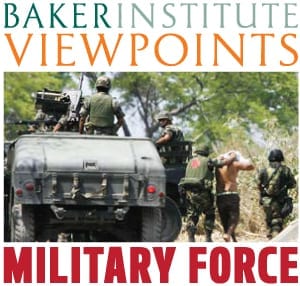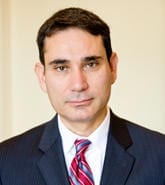 While on the campaign trail, Enrique Peña Nieto — now Mexico’s president — sought to de-emphasize the military’s role in the drug war by supporting the creation of a national gendarme and the widespread expansion of the Todos Somos Juarez, a civil society development plan. Yet the proliferation of vigilantes taking up arms to defend their villages against drug-related violence recently forced the federal government to send soldiers to Michoacán. Like his predecessor, Felipe Calderón, Peña Nieto seems poised to again put his country’s military front and center in the fight against cartels. In the fourth of a five-part Baker Institute Viewpoints series, we evaluate a fundamental question for all democratic societies facing organized crime threats: Is the deployment of troops in a domestic conflict with organized crime an appropriate use of combat forces?
While on the campaign trail, Enrique Peña Nieto — now Mexico’s president — sought to de-emphasize the military’s role in the drug war by supporting the creation of a national gendarme and the widespread expansion of the Todos Somos Juarez, a civil society development plan. Yet the proliferation of vigilantes taking up arms to defend their villages against drug-related violence recently forced the federal government to send soldiers to Michoacán. Like his predecessor, Felipe Calderón, Peña Nieto seems poised to again put his country’s military front and center in the fight against cartels. In the fourth of a five-part Baker Institute Viewpoints series, we evaluate a fundamental question for all democratic societies facing organized crime threats: Is the deployment of troops in a domestic conflict with organized crime an appropriate use of combat forces?
To answer this question, it is necessary to understand how Mexico views the role of its military; how it has historically used its military forces; and the bases for its use of the military in the country’s drug wars.
On the first issue, Mexico since the 1920s has turned to its armed forces to protect the state from domestic challenges. Though Mexico’s Constitution states that the military will not perform any government functions reserved for civilians, it also states that Mexican armed forces shall aid in the preservation of national order. This leaves much room for the Mexican government to call on the military to carry out law enforcement tasks when the state feels threatened, or to perform fundamental tasks such as preserving national order.
On the issue of the historical use of the military, Mexico has never hesitated to use its armed forces domestically to pursue its interests, political or otherwise. The Tlatelolco Massacre of 1968 is one such instance. Mexicans still resent the fact that the military fired on an unarmed student protest, killing as many as 300 students. The current human rights abuses that the military is accused of committing in its pursuit of organized crime are a vivid reminder that the military can also be used for state repression, and that Mexicans do not always distinguish between the two. In general, most Mexicans trust the military but would rather the troops remain in the barracks.
On what grounds is the Mexican government deploying troops to fight organized crime, particularly drug cartels? For starters, the Mexican government now views organized criminal syndicates as a challenge to the authority of the state — penetrating many state and local governments, intimidating government officials in many cities, corrupting thousands of bureaucrats, and even creating shadow governments in many communities. Second, Mexico’s law enforcement and justice apparatus is incapable of effectively confronting organized crime. Thus, given the threat that organized crime represents to the Mexican government — which the government cares more about than stemming the flow of drugs to the United States — and the weakness of the justice system, the government is naturally going to use the strongest means at its disposal: its armed forces.
As long as the Mexican government is unable to strengthen the police and the courts and protect them against the powerful ability of organized crime to corrupt or intimidate, it will continue to rely on its armed forces. The military has been and will continue to be deployed by necessity, regardless of the campaign promises or rhetoric of the sitting president. The Peña administration may aggressively attempt to control information about the use of the military; it may de-emphasize the use of the military in its public statements. But the Peña administration, like the Calderón administration before it, does not have an alternative.
Peña has floated the idea of a substitute for the armed forces — a gendarmerie or national police force — but such an organization cannot become an effective force against organized crime in a single presidential term. Such a goal will take decades to achieve. If an unprepared gendarmerie is deployed, the casualties will be high, defections will be many, and a take-over of the gendarmerie by organized crime will surely follow. Faced with this alternative, the military will continue to be on the front lines in the fight against organized crime, and the bodies will continue to pile up — with the number of victims remaining about the same, whether it’s the first six months of the Peña administration or the last six months of the Calderón administration.
Read the previous entries in this series:
- A never-ending mission: Soldiers as police in Mexico
- Mexico’s military plays a necessary role in internal security
- Can Mexico be in an ‘armed conflict’ with criminal gangs?
 Tony Payan is the visiting Baker Institute Scholar for Immigration Studies.
Tony Payan is the visiting Baker Institute Scholar for Immigration Studies.